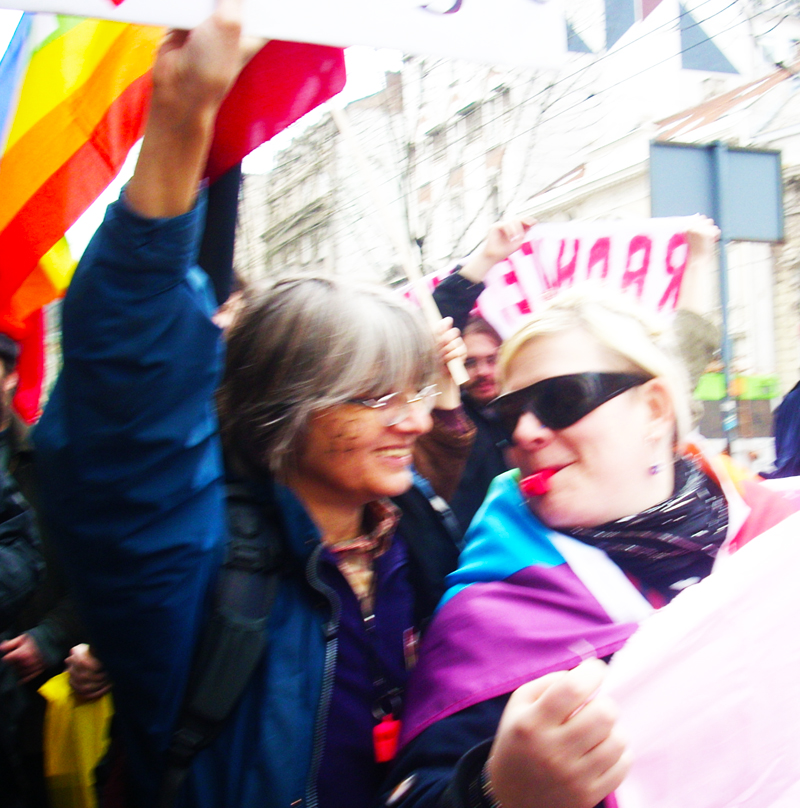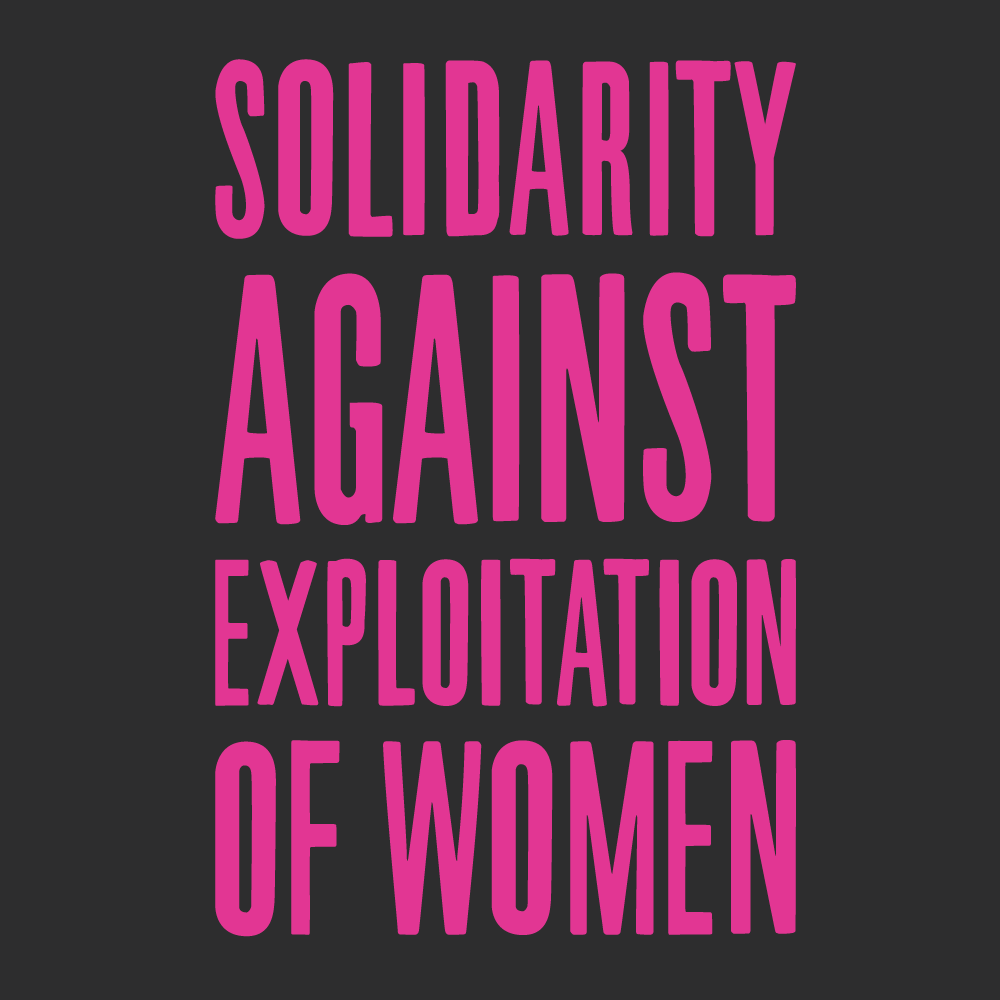 Women’s solidarity starts with my decision to hear the Other. To hear her experience, to make a space in my body for her, so that she can let her story come through the way she tells it. This means that I have agreed that experience of each woman is equally valuable. That I am important to myself and that she is important to me. That I started to accept myself unconditionally. That I started to accept all my emotions unconditionally, nevertheless no one ever told me to do this when I was young, that acceptance is what I need to do to heal.
Women’s solidarity starts with my decision to hear the Other. To hear her experience, to make a space in my body for her, so that she can let her story come through the way she tells it. This means that I have agreed that experience of each woman is equally valuable. That I am important to myself and that she is important to me. That I started to accept myself unconditionally. That I started to accept all my emotions unconditionally, nevertheless no one ever told me to do this when I was young, that acceptance is what I need to do to heal.
Women’s solidarity is a decision to listen to the experience of the Other, to try to hear the interpretation and the values the other woman has. In this process of listening to her, she is in some way already here, not there. At least for a tender moment. This means that I care about her, and that I have a space in myself for the life of the Other Woman. Then, I become the public for the Other. She has a witness. Her language is in my body. She is not alone. When I try to hear the Other, when I decide to understand her – it is a beginning of the exchange. Exchange of hers and mine fears, helplessness, shame and guilt. She is no longer excluded, left alone in her pain, neither I am. I learn about her, she learns about me. Her story initiates my change. I accept that the ethics of care is my vision of the world.
Women’s solidarity means that we have made a decision to understand the other woman, to understand her in the context of patriarchal system of hierarchies, to map her and me in the context of social discriminations and privileges. For this long process, it is needed that we learn every day from the beginning who we are, emotionally, socially, politically. To learn who is the Other in the context of historical injustices as well as in the context of the victories of women’s movement.
How shall I understand a young activist of Albanian ethnic group from Prishtina in Kosovo who has fear to talk to me the little Serbian language she knows in her town in 2012? While she was in a primary school she was entering dump private spaces as classroom, because Serbian regime from my town was threatening entire Albanian nation in Kosovo, and afterwards until 2000 killed more then 10,000 of her people. How shall I understand a fear of Roma woman from my street who avoids going to parents meeting in the white, non-Roma school of her children? Every day some of my and her neighbors use the hatred language ‘Dirty Gypsy’ in her face. How shall I understand a young woman from a small town Shabac that she avoided to tell me that loves women. Is she silent about her lesbian desire because I did not give her hint that I have a space in my body for her specific difference. How shall I ask her about her fear, and not to transmit entire history of hatred against Roma women / Albanian women / lesbian women in my voice and chosen words?
Women’s solidarity means that Ours are not more trustworthy then Others. It means we chose compassion, to have consciousness about ourselves and the other at the same time. There is no war in the world if I cherish myself and the Other who is different then me.
Solidarity is, Tijana Popivoda facilitates workshops of experience with young lesbians in Bosnia and Herzegovina in 2012. Young women have Bosniac, Croat and few Serbian names. Most of them cannot tell their parents where did they go this weekend, because to be a lesbian in their families is not yet an ordinary fact. Tijana listens to them, she asks tender questions, encourages them to speak nodding to their words, inspires laughter, leads them to try friendship with their own emotions. After that, the lesbians from the workshop they embrace each other and walk through streets of Sarajevo at ease and joy and say: She is one of ours.
Women’s solidarity is not inscribed in the textbooks, nor in the literature we read in the universities, like Shakespeare, Goethe, Dostoyevsky, Gandhi or Moravia… When I make the decision to be solidaire with women I am taking a side of a political rebel. For this is not easy, that means I need to have more activists around me who are rebels too. Who can tell me that I am right the way I am, so that at the end I can tell myself I am right.
Women’s solidarity is a beginning of defascisation of each of us. Because we choose understanding and not accusation, we choose empathy and not hate. We choose to be responsible for our acts, emotions and thoughts, instead of taking a role of a victim. This is the way to trespass the borders of national consensus about construction of the Enemy. Women’s solidarity is a politics of anti-fascism. Because we choose to care about the Other, the different then me. When we watch children with eyes of solidarity then our children are not necessarily better nor more beautiful then those of others.
Women’s solidarity is international, because gender, class and ethnic identities is only one difference among us in the world. When we express solidarity with women this means that we are breaking up with patriarchal machinery. Because I value myself equally as the other. Because I share my power with the one who has less:
I stop in my street and shake hands with the poorest in my neighbourhood, and ask her How are you? We go to a café together, even if they try to not let us enter, because the other ‘does not fit’. If I share my dignity with her – then this is how i share my power. If I am of the nationality of majority and she is from other colored people, then this is how i share my powers. We fight for her rights, we fight for my right, and then we sit together to talk of life.
And, I know that patriarchal hierarchies lead to violence against children, to violence against women and communities with less social power. To wars.
Creative disloyalty to patriarchy is the beginning of the women’s solidarity, and this means that we choose to care about ourselves and the others – equally. In full joy and acceptance of our differences.
This is why women’s solidarity is a feminist politics.
 1 in 3 women across the planet will be beaten or raped during her lifetime. That’s ONE BILLION WOMEN AND GIRLS. Every February, we rise – in hundreds of countries across the world – to show our local communities and the world what one billion looks like and shine a light on the rampant impunity and injustice that survivors most often face. We rise through dance to express joy and community and celebrate the fact that we have not been defeated by this violence. We rise to show we are determined to create a new kind of consciousness – one where violence will be resisted until it is unthinkable.
1 in 3 women across the planet will be beaten or raped during her lifetime. That’s ONE BILLION WOMEN AND GIRLS. Every February, we rise – in hundreds of countries across the world – to show our local communities and the world what one billion looks like and shine a light on the rampant impunity and injustice that survivors most often face. We rise through dance to express joy and community and celebrate the fact that we have not been defeated by this violence. We rise to show we are determined to create a new kind of consciousness – one where violence will be resisted until it is unthinkable.
This year we are Rising In Solidarity Against the Exploitation of Women. We are initiating a new series, “RISING SOLIDARITY” where we will be sharing stories of extraordinary activists from around the world about their experiences with true solidarity, harnessing a deeper understanding of why it is critical in the fight against systems of oppression and exploitation. Providing both regional and global context for what it means to stand in solidarity with each other.